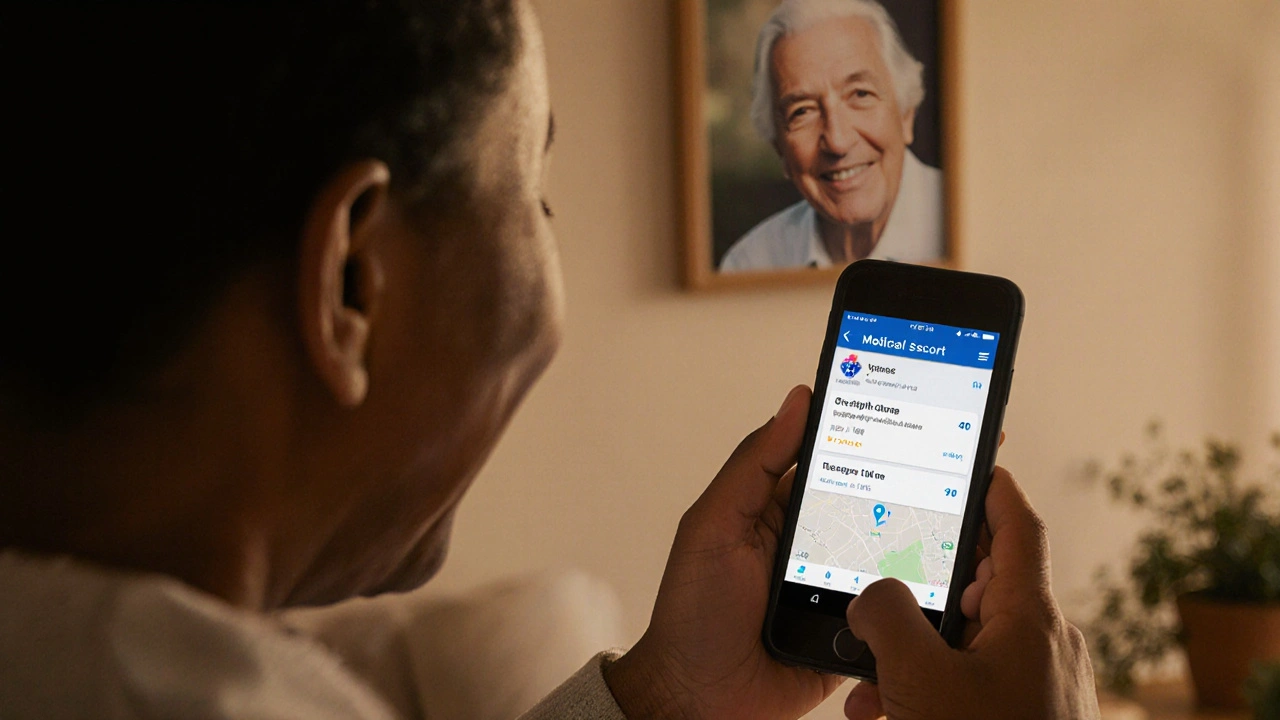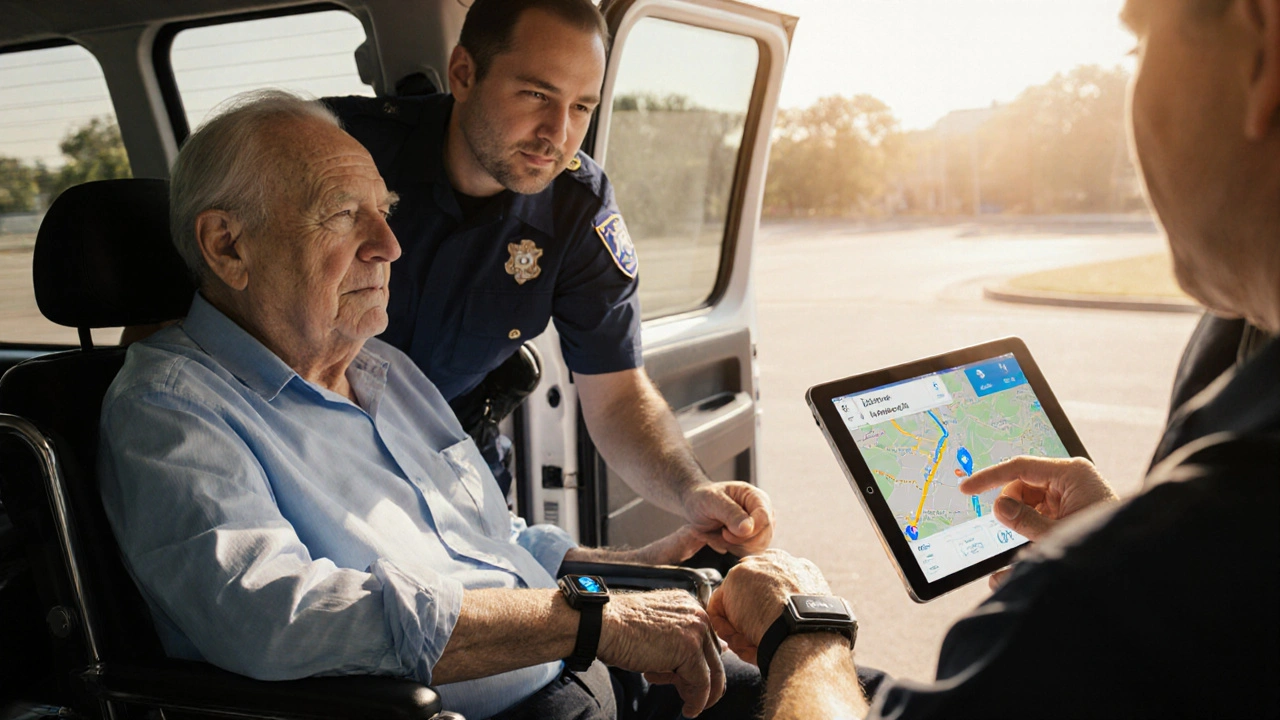When someone needs to travel to a hospital, clinic, or care facility but can’t make the trip alone-because of illness, injury, or mobility issues-medical escort services step in. These aren’t just taxi rides with a helper. They’re mobile health support systems. And behind every safe transport is a stack of technology designed to keep patients secure, calm, and monitored from door to door.
Why Patient Safety Tech Matters in Medical Escort Services
Imagine a senior citizen with heart failure getting picked up for dialysis. Or a stroke survivor needing a ride to rehab. These aren’t routine trips. A delay, a wrong turn, or a sudden drop in vitals can turn a simple transport into an emergency. That’s why medical escort services now rely on more than just trained staff. They use apps, GPS, and real-time alerts to reduce risk before it happens.
According to a 2024 report from the International Association of Medical Transport Services, over 68% of escort providers in the U.S., Canada, and Australia now use integrated safety tech. The result? A 41% drop in transport-related incidents over three years. That’s not just efficiency-it’s lives saved.
How GPS Tracking Keeps Patients Safe
GPS isn’t just for finding the nearest coffee shop. In medical escort, it’s a lifeline. Every vehicle is equipped with a GPS tracker that sends live location data to a central dispatch system. This isn’t just for route optimization. It’s for accountability and rapid response.
Let’s say a driver gets stuck in traffic on the way to a dialysis appointment. The system flags the delay. The dispatch team immediately calls the patient’s family to reassure them. If the patient starts feeling dizzy during transit, the escort can press a panic button on their tablet. The GPS pin drops on a map, and emergency services are alerted within seconds.
Some systems even track vehicle speed, sudden stops, and route deviations. If a driver takes a detour without authorization-or worse, doesn’t show up-the system flags it automatically. This isn’t surveillance. It’s safety.
Medical Escort Apps: More Than Just Booking
Most people think of ride-hailing apps like Uber. Medical escort apps are different. They’re built for clinical needs, not convenience.
Apps like MedTransport Pro and CareRide allow patients or their caregivers to:
- Book rides with specific medical requirements (oxygen, wheelchair lift, stretcher)
- View escort credentials and vehicle details before departure
- Receive real-time updates on arrival time and route
- Share trip status with family members via secure links
- Report issues during transit with one tap
One provider in Perth started using CareRide in early 2024. Within six months, patient satisfaction scores jumped from 76% to 94%. Why? Because families could see exactly where their loved one was-without calling five times a day.
These apps also sync with electronic health records. If a patient has a known allergy to latex or needs a specific oxygen flow rate, that info pops up for the escort before they even open the door.
Emergency Alerts: The Silent Guardian
Medical escort vehicles often carry wearable or handheld alert devices. These aren’t just panic buttons. They’re mini health monitors.
Many devices track:
- Heart rate
- Oxygen saturation (SpO2)
- Body temperature
- Fall detection
If a patient’s oxygen level drops below 88%, the device doesn’t just beep. It sends an alert to the escort’s tablet, the dispatch center, and-if pre-approved-the patient’s primary care provider. In one case in Brisbane, a patient with COPD started showing signs of respiratory distress during a ride. The alert triggered. The escort stopped, administered oxygen, and called ahead. By the time they reached the clinic, paramedics were waiting. The patient was stable.
Some devices even have two-way audio. If a patient is confused or unable to speak, the escort can hear their breathing, assess their condition, and respond before a crisis hits.
How These Systems Work Together
It’s not enough to have GPS, an app, and an alert device. They need to talk to each other.
The best systems use a unified platform where:
- GPS location triggers automatic app updates to family members
- A drop in SpO2 auto-logs the event in the patient’s digital record
- A delayed arrival sends a notification to the receiving clinic so they can prepare
- Every action is timestamped and stored for compliance
This integration cuts response time. It reduces paperwork. And most importantly, it gives patients and families peace of mind.
What to Look for in a Medical Escort Service
Not all services use tech the same way. Here’s what to ask before booking:
- Do you use real-time GPS tracking? Can I see the vehicle’s location during transit?
- Do escorts carry medical alert devices? What vitals do they monitor?
- Is there a mobile app for booking and updates? Can I share trip details with family?
- How are emergencies handled? Is there a direct line to medical support?
- Are staff trained to use the tech? Or is it just installed and ignored?
Ask for a demo. Watch how the app works. See the alert device in action. If they hesitate or can’t show you, keep looking.

Privacy and Data Security
With all this tracking and data, privacy matters. Reputable services follow strict health data rules-like HIPAA in the U.S., or the Privacy Act 1988 in Australia. Your medical info isn’t stored on a public cloud. It’s encrypted, access-controlled, and only shared with authorized people.
Ask how long data is kept. Who can access it? Can you delete your trip history? If they can’t answer clearly, it’s a red flag.
Future Trends: AI and Predictive Safety
The next wave is smarter. Some services are testing AI that analyzes patterns. If a patient regularly has low oxygen levels after 10 a.m. trips, the system might suggest rescheduling. If a driver tends to take longer routes on rainy days, the algorithm adjusts for weather delays before they happen.
One pilot program in Melbourne used AI to predict which patients were at highest risk of falling during transit. By adjusting seating, adding extra padding, and increasing escort checks, they cut fall incidents by 57% in four months.
This isn’t sci-fi. It’s happening now.
Bottom Line: Tech Isn’t Replacing People-It’s Empowering Them
Medical escort services aren’t about robots or apps doing the work. They’re about people-trained, compassionate staff-using smart tools to do their jobs better. The GPS keeps them on track. The app keeps families calm. The alert device catches problems before they become emergencies.
For patients, it means less anxiety. For families, it means less worry. For providers, it means fewer mistakes and better outcomes.
If you’re arranging transport for someone who needs extra care, don’t settle for a van and a smile. Ask about the tech. Demand transparency. Because when it comes to patient safety, the right tools aren’t optional-they’re essential.
Do medical escort services use GPS to track patients in real time?
Yes, most reputable medical escort services use real-time GPS tracking. The system shows the vehicle’s location to dispatch centers and, often, to family members through a secure app. This ensures timely arrivals, prevents detours, and allows rapid response if something goes wrong during transit.
Can I track my loved one’s medical transport on my phone?
Many services offer this through dedicated apps like CareRide or MedTransport Pro. You’ll get notifications when the vehicle is en route, its estimated arrival time, and live location updates. You can also receive alerts if the trip is delayed or if an emergency occurs. Always confirm this feature is available before booking.
What happens if a patient has a medical emergency during transport?
Trained escorts carry medical alert devices that monitor vital signs like heart rate and oxygen levels. If a critical change is detected, the device triggers an alert to the escort’s tablet, the dispatch center, and sometimes the patient’s doctor. The escort can stop safely, administer first aid, and call emergency services immediately. Many services coordinate with local EMS so help is ready upon arrival.
Are medical escort apps secure and private?
Reputable services follow strict health privacy laws like HIPAA (U.S.) or the Privacy Act 1988 (Australia). All data is encrypted, access is restricted to authorized personnel, and patient information is never shared without consent. You should be able to ask how your data is stored, who can access it, and how long it’s kept.
What’s the difference between a regular ride-share and a medical escort service?
Regular ride-shares focus on getting you from point A to B. Medical escort services focus on keeping you safe during the trip. Escorts are trained in basic medical care, vehicles are equipped with medical supplies and safety tech, and trips are planned around clinical needs-not convenience. They handle oxygen tanks, wheelchairs, IV poles, and emergency alerts-things Uber or Lyft don’t support.
Do medical escort services work with hospitals and clinics?
Yes, many have formal partnerships with hospitals, dialysis centers, and rehab facilities. These partnerships allow for seamless handoffs, shared electronic records, and priority scheduling. When you book through a hospital, they often recommend trusted escort providers with verified tech systems to ensure continuity of care.
